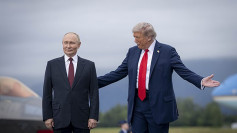President Donald Trump has asked the Supreme Court to limit three lower court rulings that blocked his executive order seeking to end birthright citizenship. The emergency appeal, filed Thursday by Acting Solicitor General Sarah Harris, urges the justices to narrow the scope of nationwide injunctions issued in Maryland, Massachusetts, and Washington state, which prevent the order from taking effect while legal challenges proceed.
"These cases-which involve challenges to the president's January 20, 2025, Executive Order concerning birthright citizenship-raise important constitutional questions with major ramifications for securing the border," Harris wrote in the filing. "But at this stage, the government comes to this court with a 'modest' request: while the parties litigate weighty merits questions, the court should 'restrict the scope' of multiple preliminary injunctions that 'purpor[t] to cover every person in the country,' limiting those injunctions to parties actually within the courts' power."
Trump's executive order, issued on his first day in office, denies U.S. citizenship to children born on U.S. soil if neither parent is a citizen or lawful permanent resident. The order immediately sparked legal challenges, with plaintiffs arguing that it violates the Citizenship Clause of the 14th Amendment. Four federal district judges have ruled against Trump's directive, issuing nationwide injunctions to prevent its enforcement.
Efforts by the Trump administration to limit the scope of those rulings in appellate courts have been unsuccessful, prompting the emergency appeal to the Supreme Court. Harris argued that these injunctions "harm the executive branch's ability to carry out its functions" and urged the court to rein in what she described as an overuse of judicial power.
"District courts have issued more universal injunctions and [temporary restraining orders] during February 2025 alone than through the first three years of the Biden administration," Harris wrote, arguing that the proliferation of these orders "threatens to swamp this court's emergency docket."
Harris further asserted that the lower court orders disrupt the administration's immigration strategy. "The district courts' universal injunctions threaten to perpetuate those problems by holding out a nationwide incentive for illegal immigration: the prospect of American citizenship for the unlawful migrants' children and of derivative immigration benefits for the migrants themselves," she wrote.
Trump has framed the executive order as part of a broader effort to address illegal immigration and overhaul the country's immigration policies. The Department of Justice has defended the order as an "integral part of President Trump's broader effort to repair the United States' immigration system, and to address the ongoing crisis at the southern border."
More than 22 states and multiple immigrants' rights groups have filed lawsuits to block the order, arguing that it contradicts the plain text of the 14th Amendment, which states, "All persons born or naturalized in the United States, and subject to the jurisdiction thereof, are citizens of the United States and of the state wherein they reside."
The plaintiffs contend that Trump's executive action is "unprecedented" and argue that no previous administration has attempted to override birthright citizenship through an executive order.
The U.S. is one of about 30 countries that grant birthright citizenship, a practice that Trump has frequently criticized. While Congress has the power to alter naturalization laws, constitutional scholars widely agree that the 14th Amendment guarantees birthright citizenship, a principle affirmed in the Supreme Court's 1898 ruling in United States v. Wong Kim Ark.
Republican and Democratic administrations have criticized the widespread use of nationwide injunctions, which have been employed by federal judges to block controversial policies. Several Supreme Court justices, including Clarence Thomas, have expressed skepticism about the practice. In a 2018 opinion concerning Trump's first-term travel ban, Thomas noted that district courts in Hawaii and Maryland had issued broad injunctions preventing enforcement of the policy and questioned whether lower courts have the authority to issue such sweeping rulings.
"If their popularity continues, this court must address their legality," Thomas wrote at the time.
The Supreme Court is expected to decide soon whether it will take up Trump's request to limit the injunctions. If granted, it could allow the executive order to be enforced against individuals not covered by the legal challenges while litigation continues.






